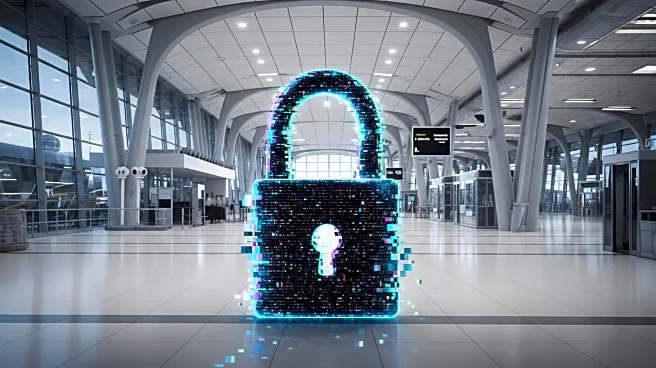What is the story about?
What's Happening?
The European Union's cybersecurity agency, ENISA, has identified the type of ransomware responsible for significant disruptions at several major European airports, including Berlin, London, Brussels, and Dublin. The cyberattack targeted a service provider responsible for check-in and boarding systems, leading to delays and cancellations of flights over the weekend. The incident affected hundreds of flights, with Brussels Airport asking airlines to cancel half of the scheduled departures on Sunday to manage the situation. Collins Aerospace, the service provider, confirmed the disruption to their MUSE software, impacting electronic customer check-in and baggage drop systems. The company is working to resolve the issue, while airports are implementing manual check-in operations to mitigate the impact.
Why It's Important?
This cyberattack highlights the vulnerability of critical infrastructure to ransomware threats, emphasizing the need for robust cybersecurity measures in the aviation industry. The disruptions have significant implications for travelers, airlines, and airport operations, potentially leading to financial losses and reputational damage. The incident underscores the importance of cybersecurity preparedness and collaboration between service providers and law enforcement to prevent and respond to such attacks. As airports are vital nodes in global transportation networks, ensuring their security is crucial for maintaining international travel and commerce.
What's Next?
Airports and service providers are expected to enhance their cybersecurity protocols to prevent future incidents. Law enforcement agencies are involved in investigating the attack, which may lead to legal actions against the perpetrators. The aviation industry might see increased investment in cybersecurity technologies and training to safeguard against similar threats. Stakeholders, including airlines and airport authorities, will likely review and update their contingency plans to ensure operational resilience in the face of cyber threats.
Beyond the Headlines
The attack raises questions about the ethical responsibilities of cybersecurity firms and service providers in protecting sensitive data and systems. It also highlights the potential for cyber warfare to disrupt civilian infrastructure, prompting discussions on international cooperation and regulations to combat cybercrime. The incident may lead to long-term shifts in how airports and airlines approach cybersecurity, prioritizing it as a critical component of their operational strategy.















